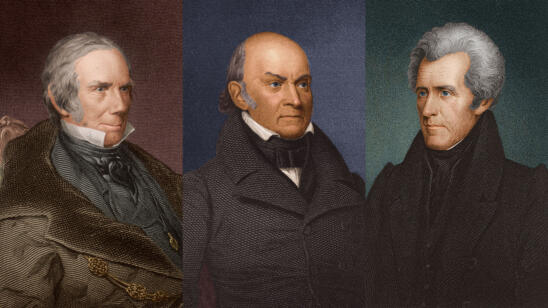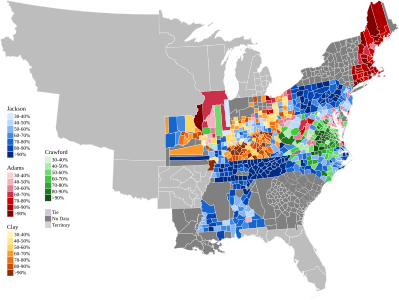 As far as U.S. presidential elections go, the 1824 one was unusually crazy. There were four major candidates, none of whom won enough electoral votes, which meant, according to the U.S. Constitution, the House of Representatives had to pick someone for president. Then, less than two weeks before the House decided, a newspaper published an anonymous letter alleging two of the candidates had made a “corrupt bargain” with each other.
As far as U.S. presidential elections go, the 1824 one was unusually crazy. There were four major candidates, none of whom won enough electoral votes, which meant, according to the U.S. Constitution, the House of Representatives had to pick someone for president. Then, less than two weeks before the House decided, a newspaper published an anonymous letter alleging two of the candidates had made a “corrupt bargain” with each other.
America 101: What is the Electoral College?
The three presidential candidates involved in this scandal were Senator Andrew Jackson, Secretary of State John Quincy Adams and Speaker of the House Henry Clay. Clay had won too little of the popular vote to be considered in the House election (according to the 12th Amendment, only the top three electoral vote-getters move on to the House).
The ‘Corrupt Bargain’ Allegation
Shortly after Clay endorsed Adams for president in January 1825, Philadelphia’s Columbian Observer printed an anonymous letter accusing Clay of making a dirty deal with Adams.
According to the letter, Clay was using his influence as speaker of the House to throw the election to Adams in exchange for becoming Adams’ secretary of state. The letter also alleged Clay had made the same offer to Jackson, who refused, making Jackson look like the more honorable candidate. This corrupt bargain was, the letter stated, “one of the most disgraceful transactions that ever covered with infamy the republican ranks.”

Clay disputed the allegations in Washington, D.C.’s Daily National Intelligencer and demanded that the anonymous author identify himself. A representative from Pennsylvania named George Kremer took credit and said he could substantiate his accusation before the House investigatory committee. However, he later refused to testify.
Adams Becomes President and Appoints Clay, Fueling Rumors
 This didn’t end the “corrupt bargain” rumors, because on February 9, the House elected Adams as president; and soon after, Clay accepted a nomination for secretary of state. These events fueled rumors of their collusion in Washington, D.C. and in newspapers around the country. Still, according to Joseph Postell, a political science professor at the University of Colorado, we don’t have conclusive evidence that they made a deal.
This didn’t end the “corrupt bargain” rumors, because on February 9, the House elected Adams as president; and soon after, Clay accepted a nomination for secretary of state. These events fueled rumors of their collusion in Washington, D.C. and in newspapers around the country. Still, according to Joseph Postell, a political science professor at the University of Colorado, we don’t have conclusive evidence that they made a deal.
“The corrupt bargain, I think, is mostly mythological,” he says. “A lot of the Jacksonian papers at the time tried to claim that this corrupt bargain had taken place. But Jackson had incentives for leaving that story out there and trying to perpetuate that story because it made him politically relevant and able to come back and win the presidential election four years later.”
Jackson was already peeved he hadn’t immediately won the election after securing 42 percent of the popular vote, and he was further incensed that the House handed the presidency to Adams, who only won 33 percent of the popular vote. Jackson and his supporters felt Adams had stolen the 1824 election, and their campaign to replace Adams with Jackson in 1828 basically began “the day that John Quincy Adams became president,” Postell says.
As for the letter’s claim that Clay had made a similar “corrupt bargain” proposal to Jackson, it’s doubtful given how much the two men hated each other. In fact, the political rivalry between Clay and Jackson is one reason why Clay probably would have supported Adams over Jackson, regardless of whether he had a job lined up.
“In general, I’m skeptical of the idea that Clay had made any explicit promises in exchange for appointment to secretary of state,” Postell says. Clay “wanted to stop Andrew Jackson from becoming president at all costs. So my sense of it is that Clay was doing this largely to stop Jackson more than he was to get a plum appointment in the John Quincy Adams administration.”